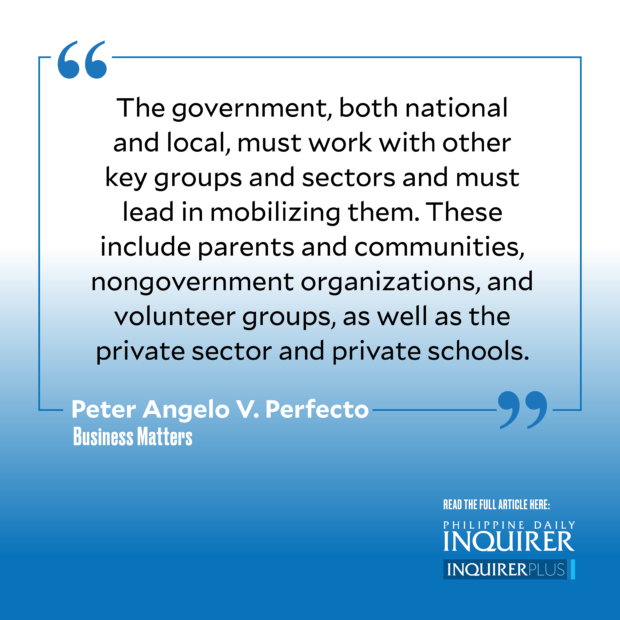As the country begins face-to-face classes again for 28.7 million enrolled students in the public school system for school year 2022-2023, the Philippine Business for Education has been at the frontlines with various other education stakeholders in calling for swift and determined action to reverse the impacts of the learning crisis. While this is certainly no easy task, especially for the Department of Education (DepEd) leaders who, like most leaders of other agencies, are still transitioning and trying to hit the ground running, acknowledging that the crisis does exist and that the government, while being the only stakeholder with the huge resources needed to address such a crisis, cannot go at this alone, is key to a sustained and successful response. The government, both national and local, must work with other key groups and sectors and must lead in mobilizing them. These include parents and communities, nongovernment organizations, and volunteer groups, as well as the private sector and private schools.
It is this need to come together and link arms for learning that spawned initiatives like the Adopt-a-School program started in 1998 and the Brigada Eskwela or National Schools Maintenance Week launched in 2003 by former DepEd secretary Edilberto de Jesus and his undersecretary Chito Gascon. Close to two decades later, Brigada Eskwela continues, and I had the privilege of joining one activity recently, becoming a part of a brigade of close to 100 volunteers to help the Dagupan City National High School. That day’s brigade was organized by Phinma University of Pangasinan and Union Galvasteel Corp. I joined to represent Phinma’s head office, as well as the Phinma Foundation, and was joined by two of my team members. Incidentally, across the Phinma Group, as of this writing, we are about to complete a record 40 schools supported under this year’s Brigada Eskwela program.
When we entered the school, a relatively new and well-built blue and white school building immediately caught our attention. On its roof, to acknowledge its donor, Security Bank was painted in huge letters—yet another testament to the continuing success of the Adopt-a-School program and Brigada Eskwela. The work of the day’s brigade started as usual with a simple ceremony to acknowledge not only the volunteers but also the school administration and faculty led by its principal, Dr. Medario de Leon, as well as the members of the parents’ association. Most of the day went into tree planting, clean-up, and painting of the older structures and of furniture—typical of a Brigada Eskwela day since the efforts began in 2003 as volunteers, students, and teachers help prepare classrooms for a new school year.
Over the years, I understand that various types of brigades beyond the maintenance needs have also come and gone. With this year’s Brigada Eskwela theme of “Tugon sa Hamon ng Ligtas na Balik-Aral,” DepEd intends to pursue Brigada Eskwela Plus, focusing on student performance to reduce dropouts, and Brigada Pagbasa as an after-school reading remediation effort. I believe that having volunteer brigades for various action opportunities and throughout the school year, spawned on the local levels based on local needs and realities, is the way forward. DepEd should revise the Brigada manual and include a whole section of developing on local levels the other needed brigades that can enhance the program’s impact, especially if the national government and the private sector will again work together to provide the needed resources.
For example, in Dagupan City National High School, a few classrooms and some walkways are flood prone even just with a little rain and during high tide. I would allow and support a Brigada Laban sa Baha for a year-round effort to address the flooding problem and ensure that the learning of our kids will no longer be affected by such flooding after one year. Some brigade types will be project-based and time-bound, while others can be annual or even a continuing concern. I believe that companies like those in the Phinma Group and Security Bank will find these various brigades of interest, especially if they will tap volunteerism to help address today’s learning crisis.
——————
Peter Angelo V. Perfecto is former executive director of Makati Business Club. He works with the Phinma Group and chairs Oxfam Pilipinas. Email: pvperfecto@gmail.com.
——————
Business Matters is a project of Makati Business Club.


